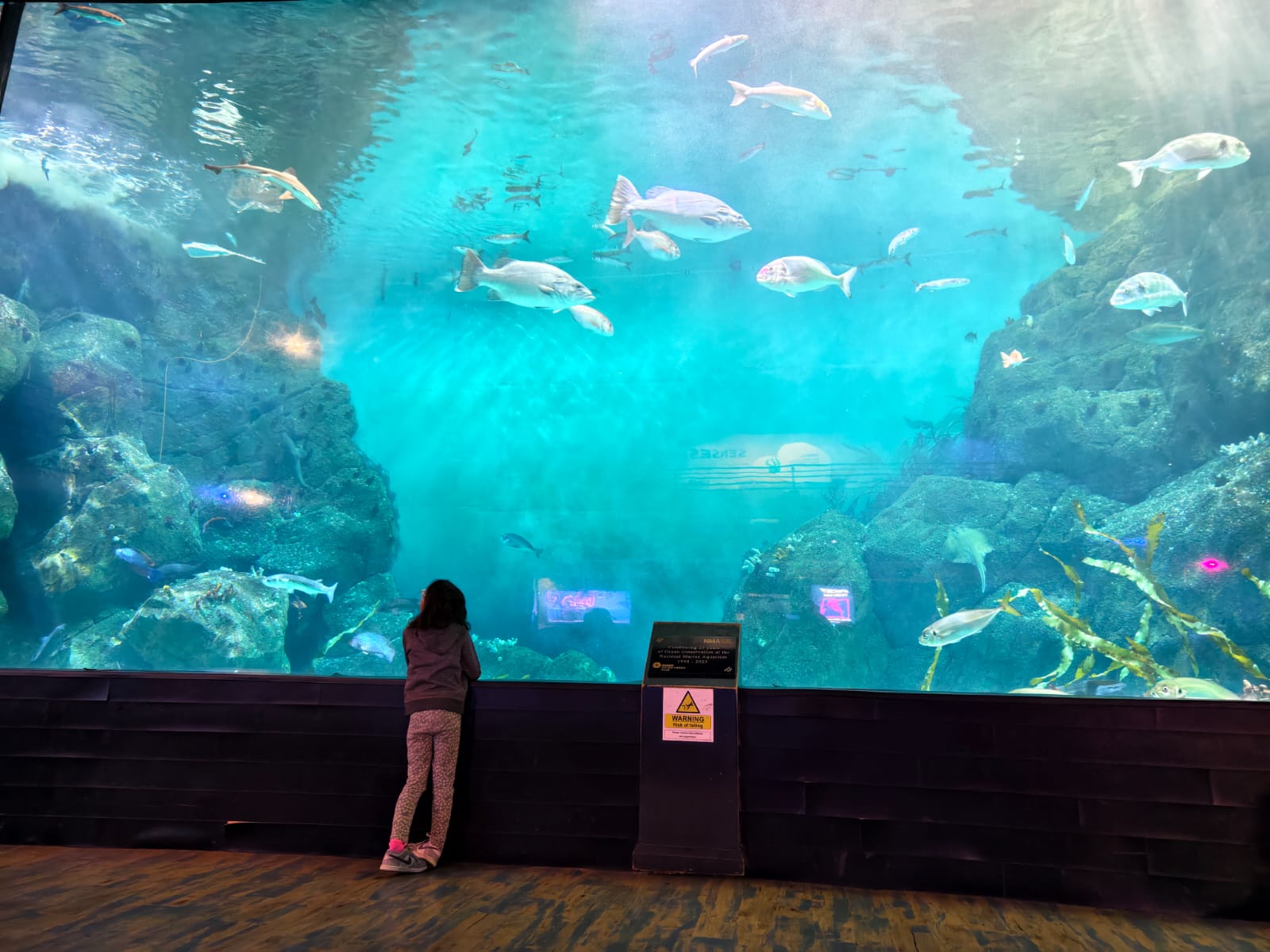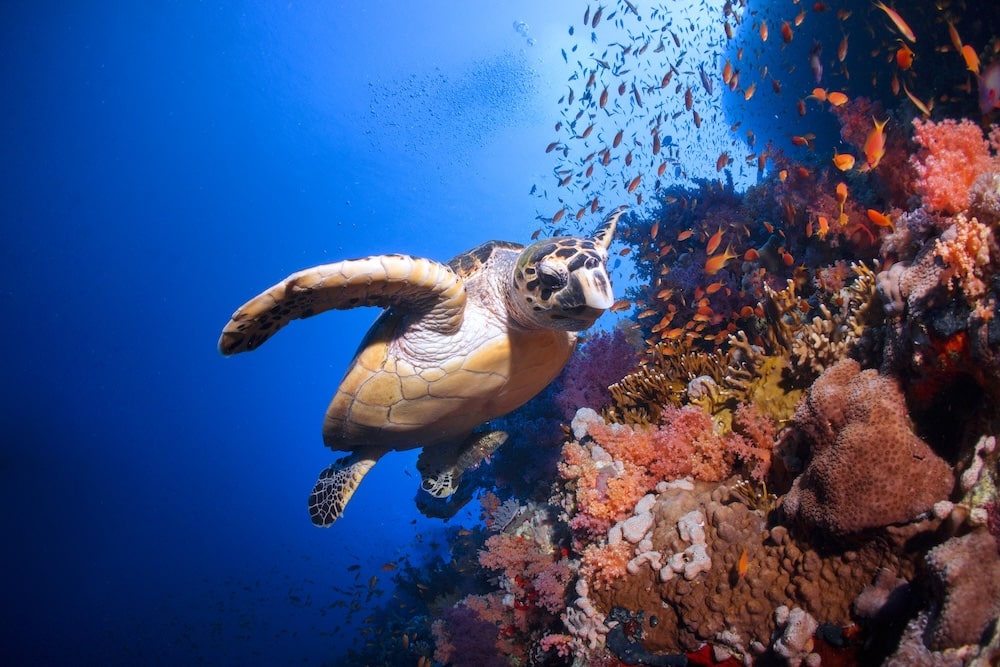
Why the ocean matters
A healthy ocean means a healthy planet
The ocean connects us all — in every breath we take and every drop we drink. It gives us oxygen, food, medicine, and meaning. It regulates our climate and sustains all life on Earth.
But it's under serious threat from climate change, pollution, and habitat destruction.
This guide is here to help you make sense of the challenges — and show how even small actions can create big change.
Top 10 ocean facts everyone should know
The ocean covers over 70% of Earth’s surface - yet most of it remains unmapped.
It holds 96.5% of all water on the planet and is a major driver of rainfall.
It produces around 70% of the oxygen we breathe - every second breath comes from the sea.
Over 3 billion people depend on the ocean for food, jobs, medicine, and transport.
It’s home to about 2 million species, with many still undiscovered.
It absorbs over a quarter of human-induced carbon emissions.
It captures about 90% of the excess heat trapped by greenhouse gases.
It contains 37 out of the 50 critical minerals.
Ocean currents move over 100 times more water than all rivers combined.
Coastal ecosystems help reduce floods, store carbon, and support communities.
What is harming the ocean?

1
.
Climate change
Climate change results in warmer oceans, rising sea levels, and increased acidification. These changes impact marine species' distribution and threaten coastal communities around the world.
Photo: Lars von Ritter Zahony / Ocean Image Bank

2
.
Overfishing
Excessive fishing harms marine ecosystems and drains fish stocks. This puts food security at risk for billions who rely on seafood, especially in coastal areas.
Photo: Charlie Pinder / Charlie Pinder Creative

3
.
Plastic pollution
Each year, millions of tons of plastic pollute our oceans. This harms marine life, as they ingest plastic or get entangled in it. It also affects human health and economies that depend on clean oceans.
Photo: Naja Bertolt Jensen / Ocean Image Bank

4
.
Shipping and marine traffic
More ships on the water create pollution, noise, and crashes with sea creatures. These issues upset ecosystems and worsen ocean health.
Photo: Michael Hall / Climate Visuals

5
.
Habitat destruction
Activities such as coastal development and bottom trawling damage crucial marine habitats. This destruction lowers biodiversity. It also weakens the ocean's ability to handle environmental changes.
Photo: Vivek Mehra / Ocean Image Bank

6
.
Ocean acidification
Higher CO₂ absorption reduces ocean pH. This makes it hard for marine life such as corals and shellfish to form shells. As a result, disruptions occur in food webs and economies.
Photo: Upamanyu Chakrabort / Ocean Image Bank / Mangrove Photography Awards

7
.
Coral bleaching
Rising sea temperatures make corals expel the algae they depend on. This causes coral bleaching and higher death rates. As a result, marine biodiversity suffers, and millions of people worldwide face threats to their livelihoods.
Photo: Daniel Nicholson / Ocean Image Bank

8
.
Lack of governance
Poor ocean governance makes it hard to manage marine resources well. This results in overexploitation and harm to the environment.
Photo: Milos Bicanski / Climate Visuals

9
.
Coastal erosion / coastal land management
Rising sea levels and poor coastal management speed up erosion. This threatens habitats, infrastructure, and economies in both developed and developing areas.
Photo: Muhammad Amdad Hossain / Climate Visuals

10
.
Illegal, unreported, and unregulated (IUU) fishing
IUU fishing hurts sustainable fisheries and endangers marine ecosystems. It also threatens the livelihoods of fishing communities, especially in the Global South.
Photo: Toby Matthews / Ocean Image Bank
Myth busters
Photo: Mick Haupt / Unsplash

Photo: Adam Sébire / Climate Visuals

Photo: John S Lewis / Climate Visuals

Photo: Rodney Dekker / Climate Visuals

Photo: Lars von Ritter Zahony / Ocean Image Bank

Photo: Daniel Nicholson / Ocean Image Bank

Photo: Colby Bignell / Climate Visuals

Photo: Naja Bertolt Jensen / Ocean Image Bank

Photo: Alex Mustard / Ocean Image Bank

Photo: Kristian Buus / Climate Visuals

Ocean vocabulary
Small actions create ripples. Ripples grow into waves. And waves can shape the world.

Photo: Caro
Be inspired
Ocean actions in your own words

Photo: Renata Romeo / Ocean Image Bank
Be inspired
Ocean actions in your own words

Photo: Guy
Be inspired
Ocean actions in your own words

Photo: Srikanth Mannepuri / Ocean Image Bank / Mangrove Photography Awards
Be inspired
Ocean actions in your own words

Photo: Cat To
Be inspired
Ocean actions in your own words
What you can do
But learning is the first step toward action. From making informed choices to speaking up, there are powerful ways we can all help the ocean.
Take action
Photos:
Top 10 ocean facts: Jeff Hester / Ocean Image Bank
What is harming the ocean?: The Ocean Agency / Ocean Image Bank
Myth busters: Cinzia Osele Bismarck / Ocean Image Bank
Ocean vocabulary: Ron Watkins / Ocean Image Bank




